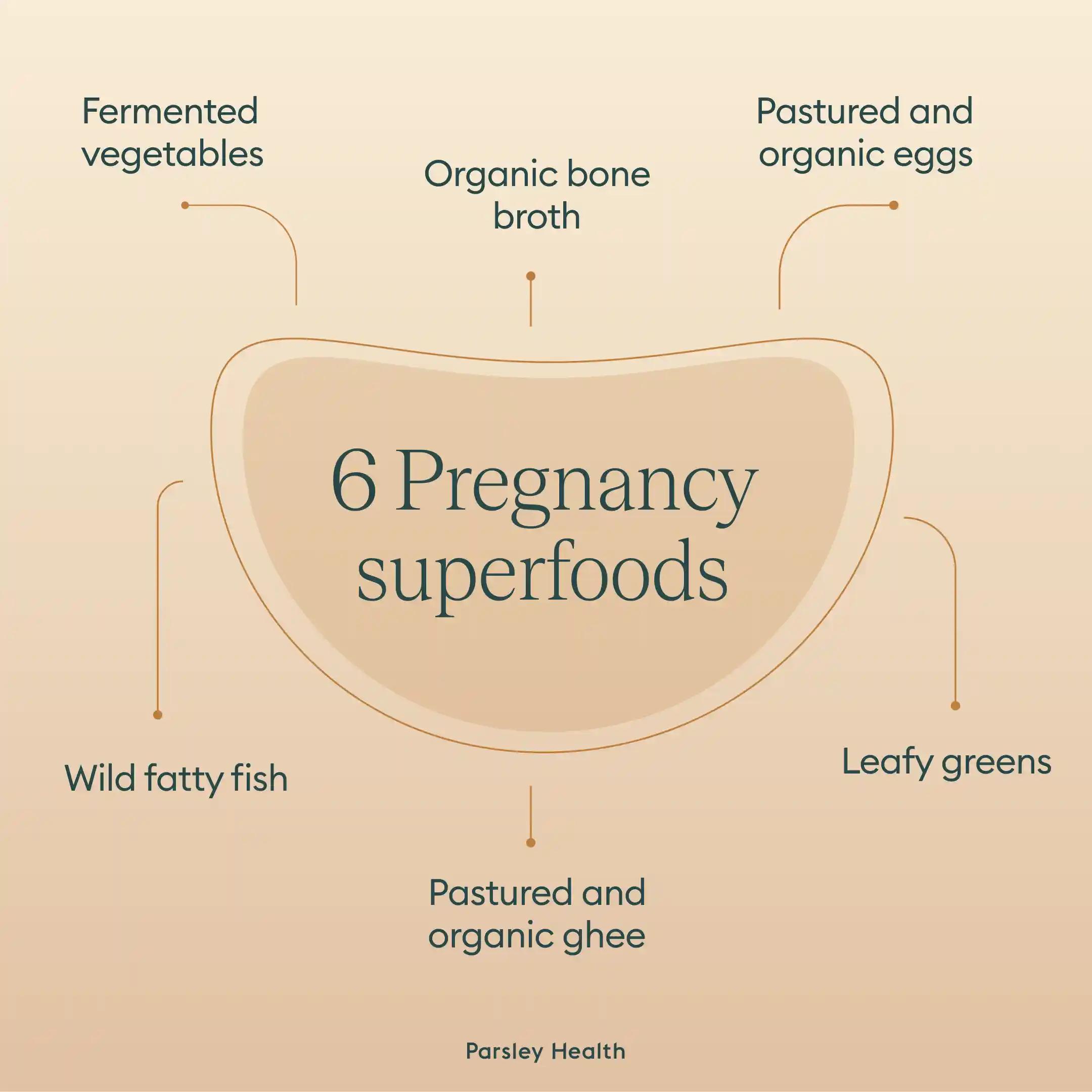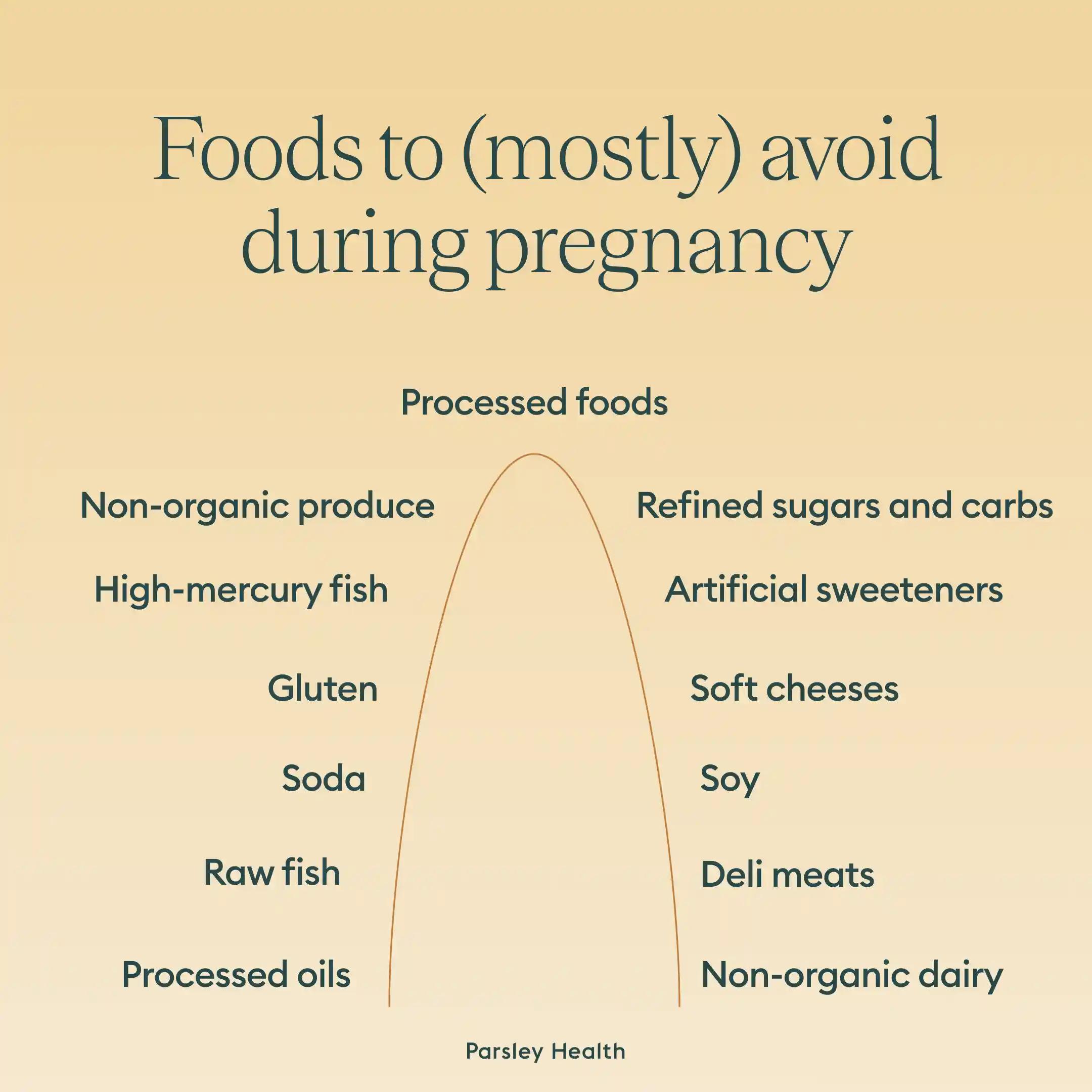At Parsley Health, we recommend taking a year to prepare your body to conceive. Our Founder and CEO Robin Berzin, MD, calls this a “fertility year." One of the best things you can do during this year is follow a fertility diet meal plan.
Diet directly impacts hormone and immune health, which in turn affect your fertility. Adhering to a healthy diet prior to becoming pregnant is also a great way to get into the habit of making healthy choices; once you are pregnant, what you eat will influence your baby’s development and future health.
Managing your blood sugar
High blood sugar levels during pregnancy can result in gestational diabetes, and will increase your baby’s susceptibility to developing diabetes later in life.
An easy way to keep your blood sugar in check is making sure that each of your meals and snacks include fat, fiber, healthy fats and protein. For example, you could begin your day with a breakfast of eggs (protein) with avocado (fat) and greens (fiber), and later snack on a green apple (fiber) with almond butter (protein and fat).
Pregnancy superfoods
When it comes to pregnancy diets, I recommend patients focus on what I call the “pregnancy superfoods.” Each of these foods is packed with the vitamins and minerals that are critical for embryonic and fetal development.

Fermented vegetables. Fermented foods like sauerkraut, pickles, and fermented beets and carrots provide the probiotics (or good bacteria) needed to build a healthy microbiome that a mother passes on to her baby starting in the third trimester. More generally, studies show that exposure to bacteria in utero can affect whether or not a child will develop allergies or asthma. You should aim to eat 2-3 tablespoons of fermented foods per day. Try them mixed into salads or as a side for your favorite protein.
Pastured and organic eggs. Eggs are a great source of protein and contain vitamins A, D, K2, and E, iron, selenium, lecithin, folate, biotin, zinc, and choline. Choline is essential for your baby’s neurological and spinal cord development, while folate is critical to DNA production. You should aim for 2-4 eggs each day; if that sounds a bit overwhelming, try adding eggs into other dishes, like soups.
Wild fatty fish. Fatty fish like salmon, anchovies, and sardines are high in omega-3 fatty acid DHA, which is critical to the brain health of both mother and baby, and vital to the development and functioning of the central nervous system. You should aim for 2 servings per week.
Leafy greens. Kale, arugula, chard, beet greens, mustard greens, spinach, romaine, collard greens, and broccoli are high in antioxidants, which help combat free radicals in the body and contain iron, calcium, folic acid, and vitamins A, C, E, K and B. Additonally, these greens are rich in sulforaphane which is a great antioxidant and helps with mental health, reduces inflammation, prevents diabetes, and improves gut microbiome. They also provide fiber, which keeps you regular, balances blood sugar, and has a high concentration of beta-carotene, which promotes growth and repair of connective tissue. You should aim for 1-2 cups of greens with at least one (ideally two) of your meals each day.
Pastured and organic ghee. Ghee us rich in vitamins A, K2, C, D, and E, DHA, selenium, and iodine. Pastured ghee also contains butyrate, which improves colon health and supports healthy insulin levels. Short-chain fatty acids like ghee have also been shown to protect against leaky gut. You can use ghee in a variety of ways, from a cooking oil to a spread. However you choose to eat it, you should aim for 3 teaspoons or 15 milliliters each day.
Organic bone broth. With the increased popularity of collagen, you may already be eating bone broth. If not, now is the time to start! Bone broth contains glucosamine and gelatin, both of which strengthen and repair the digestive tract, bones, tissue and joints. It is also a source of glycine, which is essential for fetal and placental growth. You should aim for 1-2 cups daily.
For some, it's easier to get these foods on your plate by following a specific diet. The Mediterranean diet, for example, contains leaft greens, plenty of wild fish, and fiber sources that may boost fertility.
Foods to avoid
As you munch on my pregnancy superfoods, take care to avoid the following foods and beverages. That said, if one of these slips in every now and then, don’t worry.

Non-organic fruits and vegetables, particularly those that are part of the Dirty Dozen
Refined sugars and carbohydrates
High-mercury fish, like tuna, shark, largemouth bass, swordfish, marlin, halibut, pike, king mackerel, tilefish, sea bass, Gulf Coast oysters and walleye
Soda
Non-organic dairy
Soft cheeses like Camembert, feta, Brie, blue cheeses like Roquefort and Gorgonzola, and Mexican-style cheeses such as queso blanco, queso fresco and panela
Raw fish
Soy
Artificial sweeteners
Deli meats
Processed oils like canola, soybean, palm, peanut and vegetable oil
Processed foods like chips, candy bars, cakes and cookies
Additionally, you should also focus on what you store food in. Contains that have BPA may impact fetal health and development and your repproductive health.
Keep it in perspective
While your nutrition needs will increase each trimester, the increase in caloric need is actually no greater than the equivalent of a cup of full fat yogurt and an apple with almond butter. This means that you don’t need to give into daily ice cream cravings. But hey, we’re all human, and it’s okay to have a treat every once in awhile.
Sample day: pregnancy superfoods
Wondering how all this looks in practice? Here’s a sample day to get you started:
Upon waking: bone broth with chopped scallions
Breakfast: smoothie with 2 scoops protein powder, 1 tablespoon coconut oil, 1 cup blueberries, 1 tablespoon flax, 1 cup of fresh almond milk
Lunch: chicken breast served with 2 cups of arugula tossed in olive oil (½ tablespoon) and roasted squash with ghee
Snack: 1-2 hard boiled eggs with avocado
Dinner: Wild salmon served with steamed broccoli (1-2 fists), spaghetti squash (1-2 fists) or brown rice (1 cup) with tahini sauce (½ tablespoon)
Next Steps
If interested in undertaking your own fertility year, it may be beneficial to work with a healthcare provider who can design a fertility diet meal plan. They can also provide accountability as you follow that plan and suggest other lifestyle changes to boost fertility.
At Parsley Health, we provide in-person and virtual support to individuals and couples undertaking a fertility year. Learn more and talk to a Parsley advsior about how we can support your journey to parenthood.


